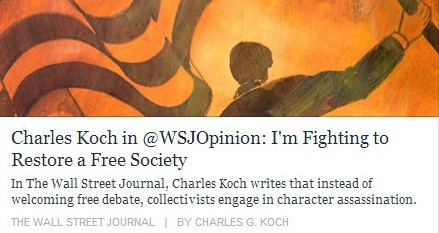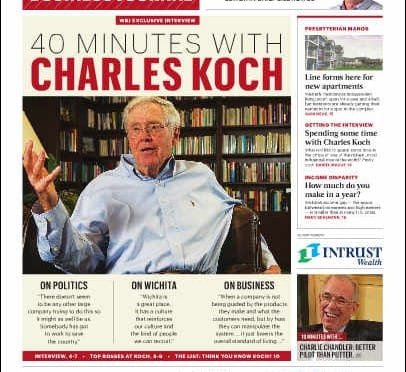Tag: Americans For Prosperity
-

In Kansas fourth district, fundamental issues of governance arise
The contest in the Kansas fourth district is a choice between principle and political expediency, and between economic freedom and cronyism.
-

For Tiahrt, economic freedom is not a good thing, it seems
Kansas congressional candidate Todd Tiahrt has criticized Charles Koch and Americans for Prosperity, leading us to wonder if Tiahrt understands or embraces the principles of economic freedom and free markets.
-
For McGinn, a liberal voting record is a tradition
Based on votes made in the Kansas Senate, the advertising claims of Sedgwick County Commission candidate Carolyn McGinn don’t match her record.
-

WichitaLiberty.TV: Citizen activists and the proposed Wichita sales tax
Two activists join host Bob Weeks to discuss activism at the local level. Then, what about the proposed sales tax increase in Wichita?
-

Wichita city council schools citizens on civic involvement
Proceedings of a recent Wichita City Council meeting are instructive of the factors citizens should consider if they want to interact with the council and city government at a public hearing.
-

Kansas news media should report, not spin
Dave Trabert of Kansas Policy Institute explains that influence may be shifting from media, unions, the education establishment, cities, counties, and school boards to those with different views — those of limited government and economic freedom that empower citizens, not an expansive government and its beneficiaries.
-
Kansas newspapers against the children
A Kansas newspaper editorial illustrates that for the establishment, schools — the institution of public schools, that is — are more important than students.
-
Harry Reid takes money from companies under investigation for bribery law violations
Senate Majority Leader Harry Reid, D-Nev., has received campaign contributions from people and political action committees linked to multiple companies suspected of violating the Foreign Corrupt Practices Act.
-

Rally for school choice in Kansas
A grassroots coalition of educators, advocates, parents, and Kansans came together to make the case for school choice in the Kansas State Capitol on 11 February 2014.
-

Kansas school finance lawsuit reaction
News coverage and reaction to the Kansas school finance lawsuit Luke Gannon, et al v. State of Kansas.
-

Wichita Business Journal remodels, features Charles Koch interview
The Wichita Business Journal has relaunched and starts its new life with features on Koch Industries and an extended interview with Charles Koch.
-
In Wichita, citizens want more transparency in city government
In a videographed meeting that is part of a comprehensive planning process, Wichitans openly question the process, repeatedly asking for an end to cronyism and secrecy at city hall.